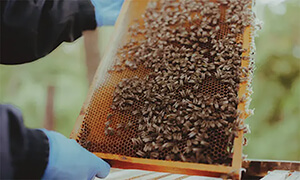
Australia “the only major honey-producing country free from varroa mite,” the most serious pest to honey bees worldwide
An emergency biosecurity zone has been imposed to stop the movement of bees across New South Wales after the deadly parasite varroa mite was discovered.
The mite was found last week at hives near the Port of Newcastle in NSW, with a further detection on Saturday at hives belonging to a commercial beekeeper about 10 km away.
The acting chief executive of the Australian Honey Bee Industry Council, Danny Le Feuvre, said up to 100 hives had been destroyed near the port as part of containment measures.
“The beekeeping industry in Australia has got its eyes on Newcastle at the moment,” he said.
“We’re still very confident that we have it contained and it’s eradicable,” he said.
Le Feuvre said the statewide standstill on bee movement was adopted to give authorities time for tracing activities, “to identify where the commercial beekeepers’ hives are, where they’ve been and what other hives they’ve been in contact with,” he said.
He said the Newcastle beekeeper also had 120 hives at Trangie in central west NSW, which were inspected before being destroyed.
“We’ve inspected all the hives at Trangie, and there have been no mites identified … however the mites are the size of a pinhead amongst thousands of bees.”
The NSW agriculture minister, Dugald Saunders, issued the order on Sunday, saying no bees will be allowed to be moved across the state.
“Australia is the only major honey-producing country free from varroa mite, the most serious pest to honey bees worldwide,” Saunders said.
The tiny reddish-brown parasites could cause severe damage to the Australian bee industry, which is worth $147m annually.
The mites spread viruses that cripple bees’ ability to fly, gather food and pollinate crops.
An initial 50 km biosecurity zone was put in place at the Port of Newcastle on Friday where beekeepers must notify the state Department of Primary Industries of the location of their hives.
All hives within the 10 km zone were eradicated, while a 25 km surveillance zone is also active around the site with officials monitoring and inspecting managed and feral honey bees.
“If varroa mite settles in the state, it will have severe consequences, so we’re taking every precaution and action needed to contain the parasite and protect the local honey industry and pollination,” Saunders said.
“We’re working with apiary industry bodies and stakeholders to ensure beekeepers are well informed and can continue to help us with this critical response,” Saunders said.


